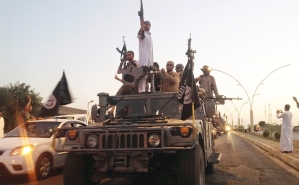
The insurgent group Islamic State of Iraq and Levant (ISIL) or ISIS is not only viewed by the US Government and most Christians as a terrible organization, but it is also drawing strong ill will from people within the Muslim community.
Yesterday, Egypt's top religious authority condemned the armed group which has forcibly taken over large parts of Iraq and Syria and committed terrible crimes and atrocities along the way.
"An extremist and bloody group such as this poses a danger to Islam and Muslims, tarnishing its image as well as shedding blood and spreading corruption," said Grand Mufti Shawqi Allam, Egypt's most influential Muslim cleric, the state news agency MENA reported. He describing the group as a corrupt, extremist organization that is damaging Islam.
Allam's view represents the opinion of Al-Azhar, one of the world's oldest seats of Muslim learning, which influences the opinions of Muslims worldwide, and came as the Vatican called on Muslim religious leaders to take a "clear and courageous stance" and condemn the "unspeakable criminal acts" being charged against the group.
Egyptian media reports said Allam also expressed his objection to the "widespread error" in referring to the group as "the Islamic State," its new name, because, according to Allam, it violates both long-established principles of Shariah and the contemporary foundations of humanitarian law, according to the Lebanon Daily Star.
The ISIL has declared a Muslim caliphate in the territory it has captured in Iraq and Syria, and named Abu Bakr al-Baghdadi as the Caliph, or political successor to Muhammad. According to the BBC, al-Baghdadi is a mysterious figure, but it is believed he was born in Samarra, north of Baghdad, in 1971 and found his start in the insurgency that erupted in Iraq soon after the 2003 US-led invasion.
In 2010 he emerged as a top battlefield commander for al-Qaeda in Iraq, one of the groups that later became ISIL.
SInce then, even Al-Qaeda has distanced itself from the ISIL.
It sees all Shi'ite Muslims, Christians, Yazidis, or any other religious group that do not strictly line up with hard line Sunni teachings as Heretics, and brags about killing people.
The group is known for burying people alive, torturing them, and also taking women and Children as slaves, if they don not rape, and kill them first.
A coalition is forming to fight against the terrorist, and just last week the United States bombed ISIL targets in northern Iraq, saying it was protecting the Kurdish autonomous region and trying to prevent what U.S. President Barack Obama called potential genocide of religious minorities.
Allam has said this was part of the divisiveness that was so troubling about the group.
"(They) give an opportunity for those who seek to harm us, to destroy us and interfere in our affairs with the (pretext of a) call to fight terrorism," He said, according to Reuters.
Other religious leaders from around the world voiced positions similar to Allam's. In Indonesia, Nahdlatul Ulama (NU) executive council chair Slamet Effendy Yusuf says he "deplores ISIL for using religion to net supporters from other countries, including Indonesia."
"The public have to be critical. This is not about [establishing] a caliphate [Islamic state]; but [a group] working for its own cause and gains from a sectarian issue," Slamet told The Jakarta Post on Friday.
Muhammadiyah secretary Abdul Mu'ti voiced a similar concern, reminding all Indonesian Muslims that Islam "did not support violence, but a common good and unity."
Follow Don Pittman on twitter @DonaldPittman.







